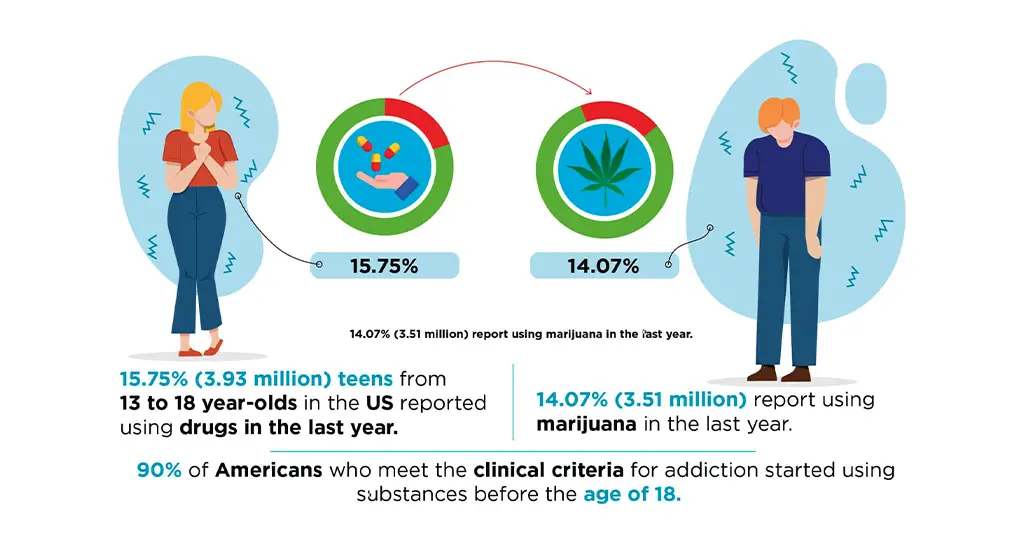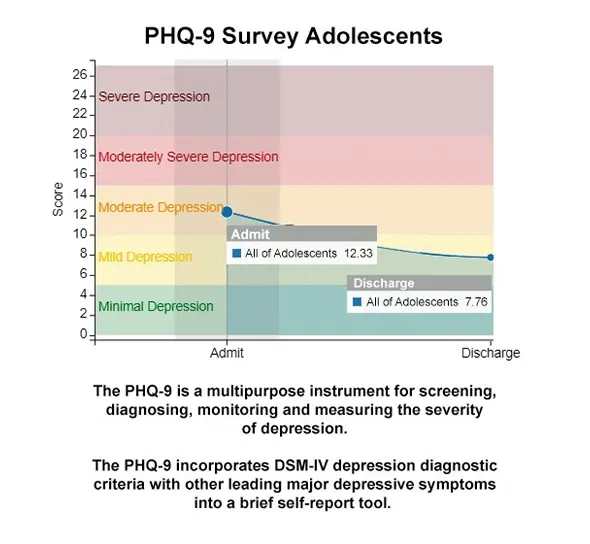Getting to know the signs of teenage substance abuse, and what your options are as a parent or concerned loved one, are important to ensuring you can offer them a helping hand in the most appropriate and effective way. You may have many scary questions, such as whether or not your teen has a drug addiction, what are the symptoms of abusing illicit drugs, do they need a treatment program for substance use, and, if so, how would you know?
SunCloud Health offers a full scope of care for teen drug treatment for adolescents suffering from a substance use disorder, as well as depression, eating disorders, anxiety, PTSD, school refusal, and other behavioral health conditions. Please contact us for an assessment to determine if our mental health services are the right fit for the needs of your child, patient, or student. Together, we can help your teen get back on track.
Substance Use Treatment for Adolescents
Teens are at an important stage in their development. Not fully experiencing the world as children or adults, they are living through a time of change, confusion, and uncertainty. Teens who struggle with substance use disorders are suffering from an adult problem, but are not fully developed adults or have the ability to cope like adults. Their needs are different from the needs of struggling adults, as are their perspectives on the world and the things that matter most to them. Therefore, addiction in teens has to be treated differently than addiction in adults.
Getting to know the signs of teen drug use, and what your options are as a parent or concerned loved one are important to ensuring you can offer them a helping hand in the most appropriate, and effective way. This article will discuss, in depth, teen drug treatment programs, and different types and signs of substance use in teens to help you better understand:
- Signs of teenage drug abuse
- If your teen might need drug abuse treatment
- What teenage drug and alcohol treatment programs typically look like
- Options for teen addiction treatment at SunCloud Health

Drug Abuse in Young Adults: What Signs Should You Look For?
- Breaking curfew and ignoring rules
- Slipping in school, both in grades and attendance
- Changes in sleep patterns
- An abrupt change in friend groups
- Money and valuable items disappearing from the house
- Relationships with family members deteriorating
- Activities that were once of interest are no longer of interest
Video: Today’s marijuana is very different than it was 20 years ago!
Video: How does THC affect the developing brain of adolescents?
Drug Use Vs. Addiction in Adolescents
If you discover or suspect that your teen is abusing substances such as alcohol, marijuana, prescription drugs, and/or other drugs, it is important to remember there is a difference between substance use and addiction. Addiction occurs when a user can no longer control the desire to use, with attempts to get sober independently not only resulting in failure, but often resulting in adverse effects such as anxiety, irritability, nausea, and other forms of illness. These are called withdrawal symptoms.
Substance Use Disorder (SUD) is the term used for patients who need help from an addiction treatment center to recover from their addiction. Your teen might be suffering from teenage drug addiction if they:
- Tried to stop on more than one occasion but could not
- Used more or for longer than intended
- Spent a lot of time sick/recovering from use
- Have increased the amount used to achieve the desired effect
- Can no longer achieve a desired effect but are still using
- Have gone long periods when using was all they could think about
- Continue to use even though it has a negative impact on their life and relationships
- Have sacrificed opportunities that were important to them in order to use
- Have been put in harm’s way due to using
- Are experiencing negative effects to their mental/physical health

Video: Does potency matter? How does marijuana lead to depression, addiction and psychosis?
What Questions Should Parents Ask a Treatment Provider?
Deciding on a teen treatment center can be a difficult decision for parents and loved ones. It’s important to ask the right questions of a potential provider, one who can guide you through complicated emotions to find the right path for your child.
To start, make sure the provider treats the condition, such as substance abuse, and truly speaks the language of the disorder, rather than having it be a small portion of what they do. Important questions to consider include:
- What is the average group counseling size?
- Is there a high or low staff-to-patient ratio?
- How often do you treat teen substance use, and is that treatment a regular part of the program?
- Are individual and family therapy sessions included in the treatment plan?
- What percentage of patients are also being treated for drug use?
- Can my teen still attend school and, if so, how will you support them in their schooling?
- How often will my adolescent see a doctor, therapist, dietitian, and other providers needed throughout their care and as part of their tailored treatment plan?
- What does the overall recovery process look like for my child, and what coping skills will they leave treatment with?
We also recommend touring the center to get a feel for the facility, speak with the staff, and make sure the provider’s day-to-day programming meets your child’s needs.
Video: DOES IT MAKE SENSE TO PULL MY KID OUT OF SCHOOL FOR TREATMENT?
Hear from Dr. Chevalier on the balance school and extracurricular activities with treatment for young adults. In most cases, coursework is unaffected and can be improved while a student is out of school receiving treatment.

Different Teen Drug Abuse Scenarios Need Different Levels of Care
Treatment for teens abusing drugs and alcohol should always be custom built around the individual. Depending on the substances and severity of the disorder, a combination of multiple forms of treatment can be implemented. These may include:
- Detox—Detox from prescription drugs, illicit drugs, alcohol, and more under professional care can be a crucial part of recovery, especially in cases involving substances prone to cause withdrawals.
- Therapy—Therapy is the most universal service offered in treatment. Talk therapy and family-oriented therapies are both common options offered to patients experiencing teen drug use. Contingency Management is a form of therapy that involves rewarding desired behavior or offering prizes after periods of sobriety.
- Motivational Interviewing—This technique involves coming alongside the teen in their decision-making, helping them to weigh the pros and cons of the decisions they face without making them feel they have lost their free will in the situation.
- Medication—Medications may be prescribed to help patients overcome teenage drug abuse. These medications can include opioids, stimulants, and mood stabilizers, though they are more common in adult treatment. However, there are cases when teen may need prescribed medications to heal from their substance use disorders.
Video: Can the brain recover from the damages caused by marijuana with abstinence and recovery?
Teenage Drug Use Treatment at SunCloud Health
Treatment centers for teen substance abuse recognize that their patients require a different approach than adult patients working through the same mental health challenges. At SunCloud Health, we understand the significance of taking a customized approach to mental health care, and tailor treatment to the adolescent for long-lasting health and happiness.
A greater emphasis is placed on the teen’s support system—friends and family are encouraged to offer authentic emotional support during treatment—while family counseling targets potential issues such as familial conflict, peer pressure, and co-occurring disorders that can all contribute to and exacerbate SUDs.
The SunCloud Health addiction treatment model sets us apart from other programs in the Chicago region with our integrated approach to mental health care, incorporating individual and group counseling that addresses the primary diagnoses along with co-occurring disorders. We offer both Partial Hospitalization Program (PHP) and Intensive Outpatient Program (IOP) options, which are designed for adolescents requiring varying levels of support, with dedicated time for schoolwork and direct collaboration with their schools.
PHP runs Monday through Friday from 9am-3:30pm. IOP is available three to five times weekly from 4-7pm. Both Partial Hospitalization and Intensive Outpatient Treatment Programs are available at our Naperville, Chicago, and Northbrook centers.
A Specialized, Individual Approach to Teen Substance Use Disorders
SunCloud Health has dedicated our attention to the needs of teens and the mental health issues they face. Our licensed behavioral health professionals are specially trained to work with young individuals experiencing teen drug use and to create individualized programs that may include group and family therapy sessions (when appropriate), process groups, skills groups, relapse prevention planning, and more.
Teens are also encouraged to communicate outside of their program to build up a community of support.
Video: WE DO NOT IGNORE THE CO-OCCURRING AT SUNCLOUD HEALTH
Dr. Kim Dennis, MD, CEDS, explains how SunCloud Health treats co-occurring mental health disorders, such as teen drug use, alcohol addiction, and more.
Video: ADDICTION RESPONDS REALLY WELL TO TREATMENT
Kevin A. Sabet, PhD, former advisor to three US presidential campaigns and President & CEO at Smart Approaches to Marijuana, explains at SunCloud Health how addiction is a unique brain disease that responds well to treatment in adults, adolescents, and young adults.
Video: What does treatment look like? “Making a Life Worth Being Sober For”
Alexander Chevalier, MD, Medical Director, Child and Adolescent Psychiatry at SunCloud Health answers the question, what does treatment for adult and teen substance use disorders look like and how do you make a live worth being sober for?
From admit to discharge, we see an aggregate improvement in our adolescents as measured by the PHQ-9. Lower scores reflect an improvement.

